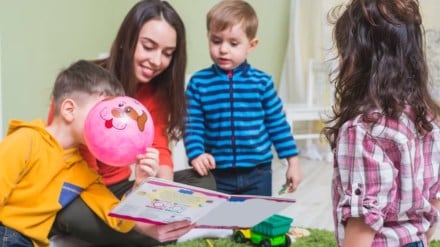By Shalini Sharma
The most critical phase of human development lasts from birth to the age of eight, according to a UNICEF study. The development of cognitive abilities, social skills, emotional well-being, and physical and mental health during these crucial years of childhood creates a solid foundation for success long into adulthood. Despite the fact that learning happens throughout one’s life, it occurs at a remarkably rapid pace throughout the early years. Children must therefore be exposed to an appropriate learning environment in order to lay a solid foundation for their future growth.
Regarded as the most significant method of embedding knowledge and education, play-based learning is essential in helping kids develop critical abilities. Experimenting and engaging with diverse aspects of a subject not only satisfies learners’ inherent interests but also develops cognitive skills, allowing them to discover unique solutions. Here preschools play an indispensable role as they provide young brains the best setting to explore and experiment, promoting the best possible growth and development.
Perks of play-based learning
Boost communication abilities: It is undeniably true that robust communication skills are at the base of an ideal child growth and comes in very handy as the child reaches maturity. Play-based learning paves the path for developing more potent connections and deeper comprehension by enabling young minds to communicate ideas and comprehend others through social interaction. For instance, children exercise new social skills such as sharing, mutual agreement, or teamwork when engaged in play-based activities, which helps their social and communication development.
Assists critical thinking: It is no hidden secret that kids learn best by doing. Playful engagement with objects and other people allows them to gain crucial knowledge and abilities. When young brains interact with the things in their environment, especially in ways that stimulate their creativity and critical thinking abilities, they are more likely to become proficient problem solvers. For example, providing children with a challenging situation or a task and offering them the freedom to explore their ways out , it not only polishes their critical thinking but also strengthens their cognitive abilities. Preschoolers can thus prepare for the realities of the real world through simple yet effective play-based activities.
Sparks creative imagination: Creativity and imagination are the pillars of ideal child development. Play-based learning enables youngsters to travel through a variety of settings, developing their creative imagination. Providing preschoolers with real, inventive objects and environments while pushing them to use their creativity to find a solution, for instance, allows them the opportunity to make their own unique discoveries.
Play-based learning: Turning education into fun!
The second target of Sustainable Development Goal 4, which aims to ensure that “all girls and boys have access to quality early childhood development, care, and pre-primary education by 2030 so that they are ready for primary education,” incorporates the significance of early learning. Access to high-quality pre-primary education has evolved into a critical tool for boosting learning and education outcomes. However, the challenge here is to combine pre-primary education while preserving the distinctive learning components that attract preschoolers’ curiosity and attention. Here play-based learning, a significant cornerstone of high-quality early childhood education, comes into the picture.
Play-based learning opportunities tap a variety of talents in learners at once, promoting the development of skills across multiple domains, including motor, cognitive, social, and emotional skills. A natural tool that assists children in developing resilience and problem-solving abilities, play-based learning allows them the opportunity to traverse relationships and face social problems while overcoming their greatest fears. Overall, engaging in playful activities offers growing minds a productive space to practice abilities, explore options, reevaluate ideas, and come up with novel challenges, resulting in deeper learning.
The author is founder, CEO of Hi-KALPAA. Views are personal.
